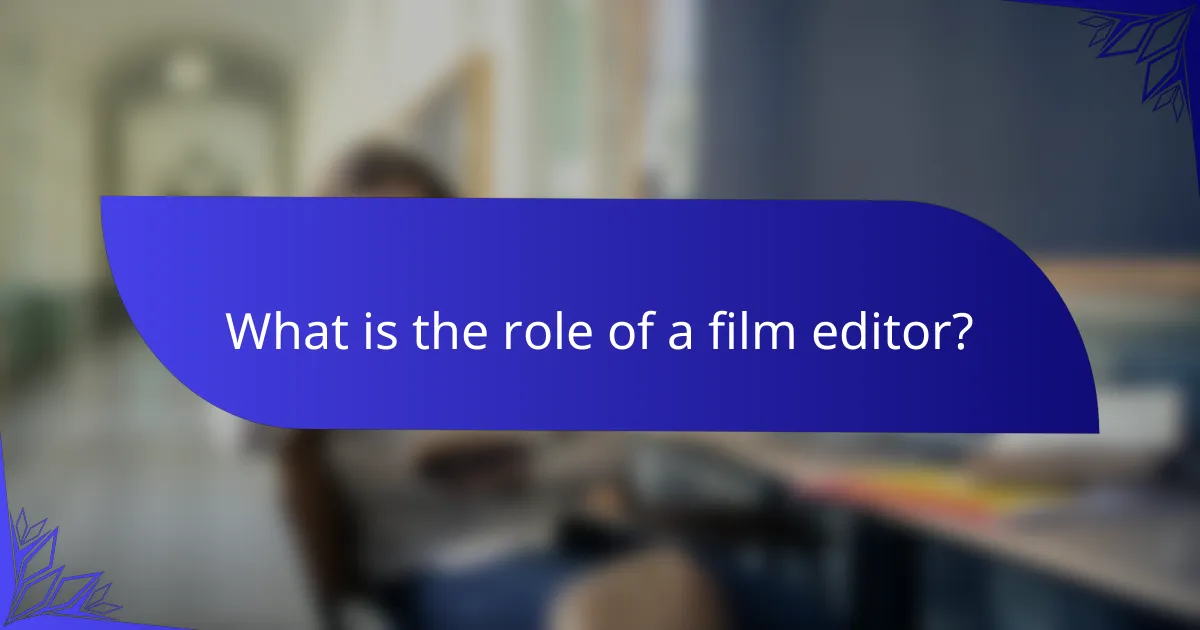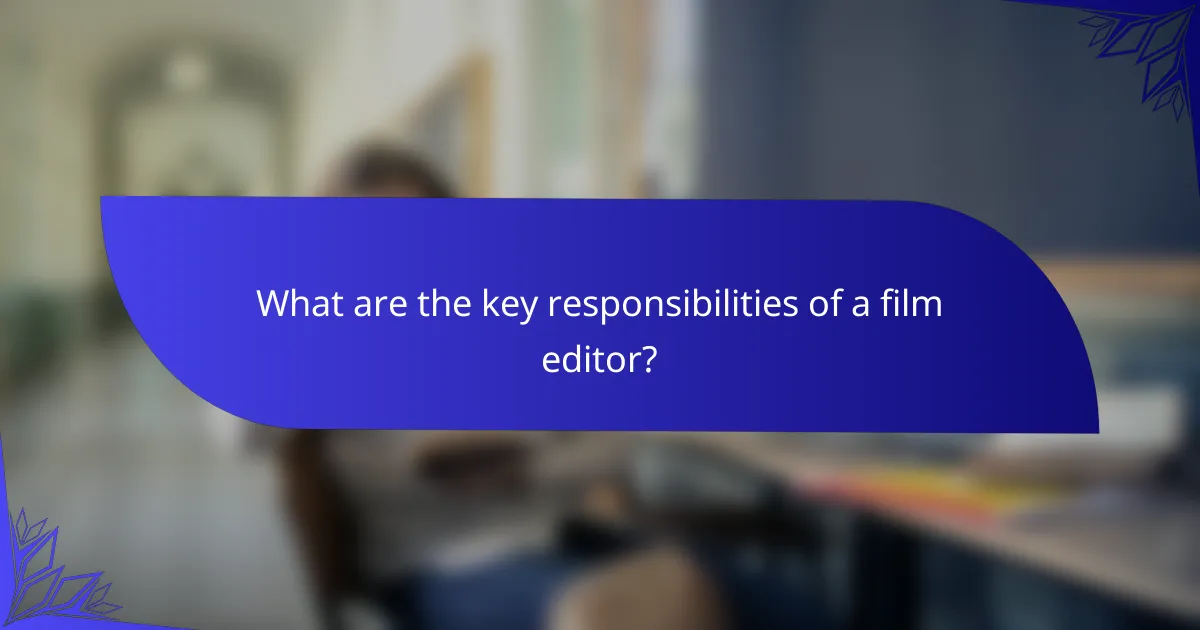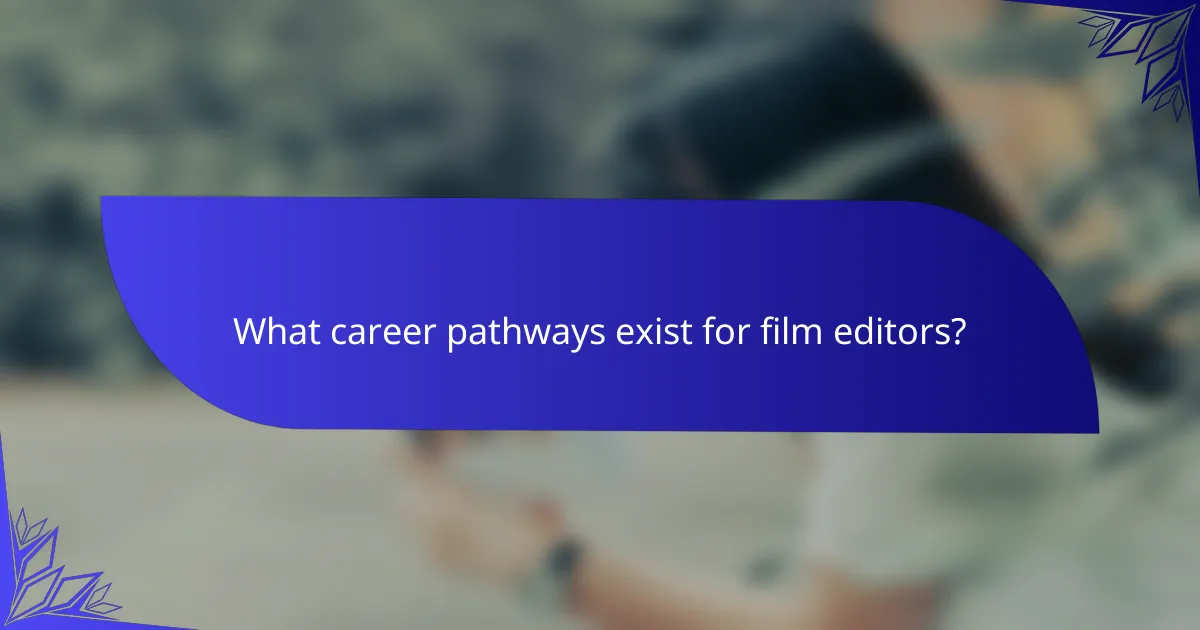The film editor is a pivotal role in the filmmaking process, responsible for assembling recorded footage into a coherent narrative. Key responsibilities include selecting and arranging scenes, managing pacing and timing, and collaborating with directors to achieve the desired vision. Film editors utilize specialized software such as Adobe Premiere and Avid Media Composer, and may also work with sound and visual effects teams. Career pathways for film editors vary, including freelance opportunities, positions in established studios, and advancement to supervisory roles. The Bureau of Labor Statistics indicates a projected employment growth of 18% for film and video editors from 2020 to 2030, highlighting the increasing demand for these professionals.

What is the role of a film editor?
A film editor is responsible for assembling recorded footage into a coherent film. This role involves selecting, cutting, and joining scenes to create a narrative flow. Film editors work closely with directors to realize their vision. They also manage pacing and timing to enhance storytelling. Additionally, they may collaborate with sound and visual effects teams. Editors utilize software like Adobe Premiere and Avid Media Composer. According to the Bureau of Labor Statistics, film and video editors had a median annual wage of $63,780 in 2021. Their work is crucial in post-production, shaping the final product that audiences see.
How does a film editor contribute to the filmmaking process?
A film editor contributes to the filmmaking process by assembling recorded footage into a coherent narrative. They select the best takes, ensuring that the story flows smoothly. Editors also enhance pacing and timing to create emotional impact. They collaborate closely with directors to realize the film’s vision. This role involves cutting scenes, adding transitions, and integrating sound. Editors utilize software tools to manipulate footage effectively. Their work significantly influences the final product’s quality and audience engagement. In fact, editing can alter the perception of a film, as seen in the Academy Award-winning films that showcase exceptional editing.
What specific tasks do film editors perform during post-production?
Film editors perform several specific tasks during post-production. They assemble raw footage into a coherent narrative. This includes selecting the best takes and cutting them together. Editors also create a rough cut of the film. They refine this cut into a final version through multiple iterations. Additionally, they work on pacing and timing to enhance storytelling. Editors collaborate with directors to ensure the vision is achieved. They may also add transitions and effects to improve visual flow. Sound editing is another critical task, including syncing audio with visuals. Finally, they prepare the film for distribution by exporting it in the required formats.
How does the film editing process influence the final product?
The film editing process significantly influences the final product by shaping narrative structure and pacing. Editors select and arrange footage to create a coherent story. They determine the rhythm of scenes through cuts and transitions. This process can evoke specific emotions in the audience. For example, quick cuts can create tension, while longer takes can build suspense. Additionally, editors enhance visual storytelling by integrating sound and visual effects. They ensure that the film aligns with the director’s vision and maintains continuity. Studies show that editing choices can impact audience engagement and perception. Overall, effective editing is crucial for a polished and compelling final film.
What essential skills are required for a film editor?
A film editor requires technical proficiency in editing software. Mastery of programs like Adobe Premiere Pro and Avid Media Composer is essential. Strong storytelling abilities are also crucial for creating a cohesive narrative. Attention to detail ensures that edits enhance the film’s flow and pacing. Collaboration skills are necessary for working effectively with directors and producers. Time management is important to meet deadlines during the editing process. A good sense of rhythm contributes to the emotional impact of the film. Knowledge of film theory can inform editing choices and techniques. These skills collectively enhance a film editor’s ability to produce high-quality work.
What technical skills must a film editor possess?
A film editor must possess skills in video editing software, sound editing, and color correction. Proficiency in software like Adobe Premiere Pro or Final Cut Pro is essential. Knowledge of sound editing tools helps in creating a cohesive audio experience. Color correction skills ensure visual consistency and enhance storytelling. Understanding file formats and codecs is crucial for efficient workflow. Familiarity with editing techniques, such as pacing and transitions, impacts the final product. Experience with visual effects can elevate the editing process. These skills collectively contribute to the effectiveness of a film editor in producing high-quality content.
How do creative skills enhance a film editor’s effectiveness?
Creative skills significantly enhance a film editor’s effectiveness by enabling innovative storytelling. These skills allow editors to make impactful choices about pacing, transitions, and visual style. A creative editor can identify the emotional core of a scene and enhance it through precise cuts. This ability helps to maintain audience engagement and convey the intended message. Moreover, creative skills facilitate collaboration with directors and cinematographers. Editors with strong creative insight can suggest alternative approaches that improve the overall narrative. Research shows that films edited with a creative perspective often receive higher critical acclaim. Thus, creative skills are essential for a film editor to elevate a project’s quality and resonance.

What are the key responsibilities of a film editor?
A film editor is responsible for assembling recorded footage into a coherent film. This includes selecting the best takes and arranging them in a sequence that tells a story. Film editors also work on pacing and timing to enhance the emotional impact. They collaborate with directors to achieve the desired vision for the film. Additionally, film editors may add sound effects and music to complement the visuals. They ensure continuity and consistency throughout the film. Editors often use specialized software for editing tasks. Their work is crucial in shaping the final product that audiences see.
How does a film editor collaborate with other film crew members?
A film editor collaborates with various film crew members through consistent communication and feedback. The editor works closely with the director to understand the vision for the film. They review footage together to determine the best takes for the final cut. The editor also coordinates with the cinematographer to ensure the visual style is maintained. Additionally, they collaborate with sound designers to integrate audio elements effectively. The editor may consult with producers to align on project timelines and budget constraints. This teamwork enhances the overall quality and coherence of the film. Effective collaboration is critical for achieving the desired narrative impact.
What role does communication play in a film editor’s responsibilities?
Communication is crucial in a film editor’s responsibilities. It facilitates collaboration with directors, producers, and other team members. Clear communication ensures that the editor understands the vision and objectives of the project. It helps in conveying ideas about pacing, transitions, and overall storytelling. Regular feedback sessions enhance the editing process and refine the final product. Effective communication also aids in resolving conflicts and aligning creative goals. According to the American Cinema Editors, strong communication skills are essential for successful project outcomes. This highlights the importance of communication in achieving a cohesive film narrative.
How does a film editor manage feedback from directors and producers?
A film editor manages feedback from directors and producers by actively communicating and implementing their suggestions. They hold regular meetings to discuss edits and revisions. During these sessions, editors take detailed notes on feedback provided. They prioritize changes based on the vision of the director and producers. Editors may create multiple versions of scenes to showcase different interpretations. They also utilize editing software to easily make adjustments. Feedback is often incorporated iteratively to refine the final cut. This collaborative process ensures the film aligns with the creative goals set by the director and producers.
What are the different types of film editing?
The different types of film editing include linear editing, non-linear editing, and montage editing. Linear editing involves arranging footage in a sequential order, typically using tape-based systems. Non-linear editing allows editors to access any frame in a digital format, providing flexibility in the editing process. Montage editing focuses on creating a sequence of shots that convey a specific idea or emotion through juxtaposition. Each type serves a unique purpose in storytelling and visual presentation.
What is the difference between linear and non-linear editing?
Linear editing involves sequentially arranging video footage in a specific order. This method requires the editor to access footage in a linear fashion, typically using tape-based systems. Non-linear editing allows editors to access any part of the footage at any time. This method utilizes digital technology, enabling more flexibility and efficiency. Non-linear editing systems can store large amounts of footage and allow for easy rearrangement. This difference significantly impacts the editing process and the creative possibilities available to editors.
How does documentary editing differ from narrative editing?
Documentary editing differs from narrative editing primarily in its approach to storytelling. Documentary editing focuses on real events and factual content. Editors prioritize authenticity and factual accuracy in this genre. They often work with raw, unscripted footage to convey a true story. Narrative editing, on the other hand, emphasizes scripted content and fictional storytelling. Editors in this field structure the story to enhance dramatic tension and character development. They have more creative freedom to manipulate time and space for narrative effect. This distinction highlights the different objectives and techniques used in each editing style.

What career pathways exist for film editors?
Film editors can pursue various career pathways within the film and media industry. They may work as freelance editors, collaborating with independent filmmakers or production companies. Many film editors join established studios or networks, working on feature films, television shows, or documentaries. Some advance to supervisory roles, such as lead editor or post-production supervisor, overseeing editing teams. Others may specialize in specific genres, like commercial editing or music video editing. Film editors can also transition into related fields, such as directing or producing, leveraging their storytelling skills. According to the Bureau of Labor Statistics, employment of film and video editors is projected to grow 18% from 2020 to 2030, indicating a strong demand for professionals in this field.
What educational background is beneficial for aspiring film editors?
A beneficial educational background for aspiring film editors includes degrees in film production, cinematography, or media studies. These programs typically cover essential technical skills and storytelling techniques. Many film editors also benefit from courses in editing software like Avid Media Composer or Adobe Premiere Pro. Practical experience through internships or projects enhances their understanding of the editing process. According to the U.S. Bureau of Labor Statistics, a degree in a related field is common among film editors. Networking opportunities in film programs can lead to job placements in the industry.
How can internships and entry-level positions help in building a career?
Internships and entry-level positions are crucial for building a career in film editing. They provide hands-on experience in a real-world environment. This experience helps develop essential skills specific to the industry. Interns can learn software tools and editing techniques directly from professionals. Networking opportunities arise from working alongside experienced editors and filmmakers. Such connections can lead to future job opportunities. According to a survey by the National Association of Colleges and Employers, 70% of interns receive job offers from their internship companies. This statistic highlights the effectiveness of internships in securing full-time positions. Entry-level roles allow individuals to understand the workflow and dynamics of film production. This foundational knowledge is vital for career advancement in film editing.
What are the potential career advancements for film editors?
Film editors can advance their careers by moving into senior editing roles, directing, or producing. They may become lead editors on larger projects, overseeing teams of editors. Some film editors transition to positions like post-production supervisors. Others may choose to specialize in specific genres, such as documentaries or commercials. Networking can lead to opportunities in higher-budget films or television series. Experience and a strong portfolio can facilitate these advancements. Continuous skill development through workshops or courses can also enhance career prospects. The film industry often values proven track records and innovative storytelling capabilities.
What roles can film editors transition into within the industry?
Film editors can transition into various roles within the industry. Common transitions include positions such as director, producer, or screenwriter. Editors possess a deep understanding of storytelling, which is crucial for directing. Their experience in managing timelines and budgets can lead to producing roles. Additionally, editors often have strong writing skills, making screenwriting a viable option. Other potential roles include assistant director or post-production supervisor. Each of these positions leverages the skills developed as a film editor.
How does experience impact a film editor’s career trajectory?
Experience significantly impacts a film editor’s career trajectory. It enhances technical skills and creative decision-making. Experienced film editors often gain access to higher-profile projects. They are more likely to be trusted with complex editing tasks. Industry connections typically grow with experience, leading to new opportunities. According to the Bureau of Labor Statistics, experienced editors earn higher salaries. They often have a portfolio showcasing diverse work, which attracts clients. Overall, experience is a crucial factor in career advancement for film editors.
What tips can help aspiring film editors succeed?
Aspiring film editors can succeed by mastering editing software. Familiarity with programs like Adobe Premiere Pro and Final Cut Pro is essential. Building a strong portfolio is also crucial. This showcases editing skills and creativity to potential employers. Networking within the film industry helps in finding job opportunities. Attending film festivals and workshops can facilitate valuable connections. Continuous learning is important due to evolving technology and trends. Engaging in online courses or tutorials can enhance skills. Seeking feedback from peers can improve editing techniques. These strategies collectively contribute to a successful career in film editing.
How can networking enhance a film editor’s career opportunities?
Networking can significantly enhance a film editor’s career opportunities. It opens doors to job referrals and collaborations. Building relationships with directors, producers, and other editors increases visibility in the industry. Networking events and film festivals provide platforms to showcase skills. Engaging with industry professionals can lead to mentorship opportunities. According to a survey by the Editors Guild, 70% of editors found jobs through personal connections. This highlights the importance of networking in securing positions. Networking also facilitates access to exclusive projects and resources. Overall, strong professional relationships can accelerate career advancement for film editors.
What resources are available for continuous learning in film editing?
Online platforms like MasterClass, Coursera, and Udemy offer courses specifically in film editing. These platforms provide structured learning paths and expert-led tutorials. Books such as “In the Blink of an Eye” by Walter Murch offer insights into the philosophy of editing. YouTube channels like Film Riot and Premiere Gal provide free tutorials and tips. Professional organizations, such as the American Cinema Editors (ACE), offer workshops and networking opportunities. Attending film festivals can also provide access to workshops and panels led by industry professionals. Finally, joining online forums and communities can facilitate knowledge sharing and feedback on editing techniques.
The main entity of the article is the film editor, a professional responsible for assembling recorded footage into a coherent film. The article covers the essential skills required for film editing, including technical proficiency in software and strong storytelling abilities, as well as the key responsibilities of film editors, such as collaborating with directors and managing pacing. It also discusses the various types of editing, the impact of editing on the final product, and potential career pathways for film editors, highlighting the importance of experience and networking in advancing within the industry. Additionally, resources for continuous learning and tips for aspiring editors are provided to support career development.